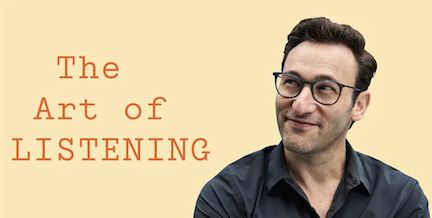The Great Gift of Listening
Mark Lukach recounted to The Guardian how inadvertently listening to his emotionally ill, suicidal wife, helped her cope with her mental illness:
One afternoon my wife, Giulia, asked me: “Mark, if I kill myself, will you promise me that you will find a new wife so that you can still be happy?” I sighed and leaned back into the chair next to her, unsure of what to say.
Actually, that’s not entirely true. I knew exactly what I wanted to say. I had been saying it for eight months. It’s just that at that moment, I was so tired – tired from work, tired from worry, tired from so many conversations about suicide – that I didn’t have the energy for it again. So I sat in silence.
My wife had been hospitalised eight months previously with a psychotic break. It started with a new job, which made Giulia more stressed than she had ever been, to the point of work paralysis, loss of appetite and inability to sleep. The slide into psychosis was rapid and entirely unexpected. Sure, she had been stressed out before, but nothing like this. Out of desperation, I took her to the emergency room, where they admitted her to the psych ward for 23 days to address her escalating paranoia and delusions.
She came home from the hospital heavily medicated and suicidally depressed. She had little to no energy for anything, and spent much of her time wishing that she could kill herself.
This was terrifying for me. I took a few months off work, so that she wouldn’t be alone all day, a prospect that worried me and her doctors. When she brought up suicide, which was all the time, I panicked. I treated her feelings like a fire, and I was the extinguisher. I had to act quickly, otherwise the warning sparks could grow.
Her first fixation was on overdosing on her medication, so I concocted a plan to hide the pills. I changed the hiding place every few days, and retrieved the medication each night as she waited for me in the bathroom, and then hid them again after she took them. Can’t overdose on pills if you can’t find them.
Then her focus shifted to the Golden Gate Bridge. She wanted to drive there on our scooter and jump off, and she told me about this, over and over again. I couldn’t hide a bridge.
She told me these things when we were walking on the beach together, or at home cooking dinner, but I was so afraid that I responded in full emergency mode, as if we were up on the bridge, Giulia on one side of the railing and me on the other. I couldn’t not see it that way. Someone I loved was in pain, and I needed to do something about it.
“Doing something” meant reminding her of all the reasons it was worth staying alive – how good we had it, how much our families loved us, how much there was to look forward to. It almost became a script, a choreographed dance: she told me she felt suicidal; I tried to overwhelm her feelings with why she shouldn’t feel that way. It never convinced her of anything. But on that afternoon, exhaustion had beaten me down into shutting up. I sat quietly and held her hand.
She looked at me in surprise. Cautiously, she ventured with another thought. “I hate myself so much, and I want to die,” she said, and I said nothing.
“I wish I had never been born,” she said.
More silence.
She continued through her tortured feelings. I listened, and hated what I heard, but I knew that at this moment she was safe. We weren’t actually there on the bridge railing. We were at home, together, and there was no way she could act upon her pain. These were just words.
And then she left me stunned. “Thank you for listening to me,” she said, pulling my hands to her lips to kiss. “It’s so nice to talk to you. I feel a lot better.”
I hadn’t said a word. It dawned on me how little I had been listening to her, without judgment or rush to action. She didn’t need me to tell her that everything was going to be OK. That didn’t help. She needed me to hear her pain. Being heard somehow made it more manageable.

He concluded:
On that afternoon I finally learned that when any of us is in pain, the greatest gift you can give is to listen, patiently and purely.
The best biblical example of this principle comes to us from the Book of Job. As he sat on his ash heap in deepest mourning, his friends approached and visibly saw his depair. His grief was palpable. Then scripture says this:
"Then they sat on the ground with him for seven days and seven nights. No one said a word to him, because they saw how great his suffering was" (Job 2:13, NIV).
Before his friends grew weary of sitting silently, having given into their baser instincts of shame and judgement, they first sat silently. In quiet compassion, they sat silently. In solidarity with his pain, they sat silently.
Those were probably seven of the most comforting, consoling days of Job's entire horrific ordeal.
Rather than inadvertently stumbling upon the gift of listening, as the author above did, let us intentionally purpose to listen first ... patiently and purely!
"My dear brothers and sisters, take note of this: Everyone should be quick to listen, slow to speak and slow to become angry" (James 1:19, NIV).
Quieting to Hear God's Voice
My father-in-law grew up on a ranch north of Austin, Texas. As a boy he was given free reign to walk the fields and hillsides of his family's property, hunting for birds and any other adventure a boy could come up with.
One day he set out into the range, watching the trees and skies for birds. As he walked he neglected to keep his bearings. Hours into his adventure, he looked around, realizing that he didn't recognize his surroundings. He called out for his father, his mother, his brothers, but there was no answer. He called louder, and his cries of fear grew louder still. But he was good and lost.
He sat down on a rock and the tears flowed for a while until he finally quieted himself down. And in the distance he heard something familiar; it was the windmill for the watering trough. It was faint, but he was able to tell the general direction. Following the faint sound, he found his way to the windmill, and from the windmill, his way home.

Have you ever found yourself lost in life, without your bearings? Perhaps you've wondered so far from the path of wisdom that you don't even realize just how lost you are. But once you do, fear and panic overtake you. In the chaos, the noise of your circumstances can overwhelm you and drown out the one sound you actually need to hear ... that "still small voice" of God.
Then the LORD said, “Go out and stand on the mountain before the LORD. Behold, the LORD is about to pass by.” And a great and mighty wind tore into the mountains and shattered the rocks before the LORD, but the LORD was not in the wind. After the wind there was an earthquake, but the LORD was not in the earthquake. After the earthquake there was a fire, but the LORD was not in the fire. And after the fire came a still, small voice. When Elijah heard it, he wrapped his face in his cloak and went out and stood at the mouth of the cave" (I Kings 19:11-13, BSB).
We have to learn to quiet ourselves enough to hear the voice of God leading us back to Himself.
"But I have calmed and quieted my soul, like a weaned child with its mother; like a weaned child is my soul within me" (Psalm 131:2, ESV).
“Be still, and know that I am God" (Psalm 46:10, ESV).
A Powerful Rest
"One of the most universally recognized pieces of music of all times is Beethoven's 5th Symphony. You know the one: dun dun dun dunnnnn...dun dun dun dunnnnnn. You know the song, but what you may not know is that the song starts with an 8th note of rest. A song that begins with a rest! As strange as that is, it creates a uniquely powerful melody.
The strategic 8th note rest continues through the entire song."
A rest is a highly unusual way to begin a piece of music. But realize that the Christian life also begins with a rest. Before God can make a beautiful symphony of our lives, we must first find complete rest in His Son.
"Come to me, all you who are weary and burdened, and I will give you rest" (Matthew 11:28).
Illustration Exchange